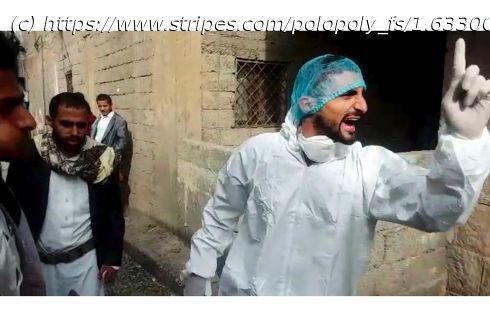Secretly filming the burials on smartphones in defiance of the Houthi orders has become an act of heroism, local resident said in interviews, adding that the amateur videos give Yemenis the only true glimpse of the true impact of COVID-19 in the region.
In the darkness, the bodies of suspected victims of coronavirus are carried in silence, one after the other, to be buried in several cemeteries across northern Yemen. Flashlights flicker as mourners make their way through the shadows.
The corpses are washed with disinfectants, wrapped in layers of plastic sheets and white linen before being laid to rest in six-feet deep pits. There is no one around except for a handful of relatives in masks, gloves, and white gowns. Large gatherings are not permitted. Phones are not allowed.
Grave diggers and guards at the cemeteries are warned not to speak about the causes of the deaths. If asked, they are told to say that the dead are „unidentified bodies from the war,“ according to several residents and one gravedigger. Families are never really told if their relatives died from the coronavirus, which is believed to be the culprit. Test results are never released. These daily funeral rituals come as social media are flooded with condolences and photographs of the dead.
The coronavirus is spreading throughout Yemen, a county that has been devastated by five years of civil war. The fighting is between the Iranian-backed Houthi rebels who control the capital, Sanaa, and much of the country’s north, and a U. S.-backed, Saudi-led coalition fighting on behalf of the internationally recognized government.
The fighting has already killed more than 100,000 people and displaced millions. Years of aerial bombings and intense ground fighting has destroyed thousands of buildings, leaving half of Yemen’s health facilities dysfunctional. About 18% of the country’s 333 districts have no doctors. Water and sanitation systems have collapsed. Many families, especially among the millions displaced by fighting, can barely afford one meal a day.
The COVID-19 pandemic has added to the deadly toll of the war in Yemen, crippling a health system already in shambles with little capacity to test those suspected of having the virus. The country has no more than 500 ventilators and 700 ICU beds nationwide. There is one oxygen cylinder per month for every 2.5 million people.
The situation is exacerbated in the Houthi-controlled north, where the rebels have suppressed information about the virus, severely punished those who speak out, enforced little mitigation measures, and promoted conspiracies and claims by the Houthi minister of health that their scientists are working on developing a cure for COVID-19 to present to the world.
Officially, the rebels say that only four cases of coronavirus have been detected in the regions they control, but have resisted making the number of positive cases and deaths public.
„We don’t publish the numbers to the society because such publicity has a heavy and terrifying toll on people’s psychological health,“ said Youssef al-Hadhari, spokesman for the Houthi health ministry, in response to questions by The Associated Press.






